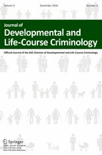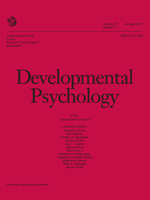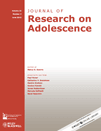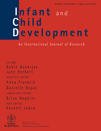
Journal of Developmental and Life-Course Criminology
Scope & Guideline
Innovating Research on Developmental Pathways and Justice
Introduction
Aims and Scopes
- Developmental Trajectories of Crime:
This area examines how criminal behavior evolves throughout different stages of life, considering the impact of early experiences, family dynamics, and social contexts. - Intergenerational Influences:
Research in this scope investigates how criminal behaviors and risk factors are transmitted across generations, exploring the roles of familial relationships and environmental influences. - Psychosocial Factors in Criminality:
The journal emphasizes the importance of psychosocial factors, including mental health, agency, and peer influences, in understanding the onset and persistence of criminal behavior. - Preventive and Intervention Strategies:
A significant focus is on evaluating the effectiveness of various intervention and prevention programs aimed at reducing delinquency and supporting at-risk youth. - Methodological Innovations:
The journal encourages the use of advanced methodological approaches, such as longitudinal studies and trajectory analysis, to provide robust insights into the dynamics of crime over the life course.
Trending and Emerging
- Impact of Mental Health on Criminal Behavior:
There is an increasing focus on the interplay between mental health issues and criminal behavior, examining how psychological factors contribute to delinquency and recidivism. - Role of Peer Influence:
Emerging research emphasizes the significance of peer dynamics, particularly how peer relationships affect delinquent behavior and the development of prosocial behaviors. - Turning Points and Life Events:
Recent studies are increasingly exploring how significant life events, such as parental incarceration or educational transitions, serve as turning points that can alter an individual's trajectory concerning crime. - Intersectionality in Criminology:
A growing body of work is addressing how intersecting identities (such as gender, ethnicity, and socioeconomic status) influence criminal behavior and experiences within the justice system. - Cumulative Risk Models:
Research is trending towards understanding the cumulative risk factors that contribute to criminal behavior, highlighting how multiple adverse experiences can interact over time to increase risk.
Declining or Waning
- Traditional Theories of Crime:
There has been a noticeable decrease in the application of traditional criminological theories, such as strain theory or routine activity theory, in favor of more nuanced developmental and life-course perspectives. - Focus on Adult Criminality:
Research centered exclusively on adult criminal behavior without consideration of developmental antecedents has become less frequent, as the journal increasingly emphasizes the life-course perspective. - Single-factor Explanations:
The journal has moved away from studies that focus on single-factor explanations of crime (e.g., socioeconomic status alone) towards more complex, multifactorial analyses that consider the interplay of various influences.
Similar Journals

DEVELOPMENTAL PSYCHOLOGY
Shaping the Future of Developmental ResearchDEVELOPMENTAL PSYCHOLOGY is a prestigious journal published by the American Psychological Association, dedicated to advancing the field of developmental psychology through rigorous research and insightful analysis. With an impact factor that ranks it in the Q1 category for Demography, Developmental and Educational Psychology, and Life-span and Life-course Studies, this journal stands as a leading resource for scholars and practitioners alike. Since its inception in 1969, it has provided a platform for innovative studies that address crucial questions surrounding human growth and development across the lifespan. The journal is recognized for its high-quality contributions, as reflected in its impressive Scopus rankings, positioning it within the top tiers of its field. Although it is not an open-access publication, it remains an essential reading for those invested in understanding the complexities of development across various stages of life. Published quarterly, DEVELOPMENTAL PSYCHOLOGY plays a critical role in shaping future research agendas and informing practical applications in educational and clinical settings.

Research on Child and Adolescent Psychopathology
Innovating solutions for brighter futures.Research on Child and Adolescent Psychopathology, with ISSN 2730-7166 and E-ISSN 2730-7174, is a premier academic journal published by Springer, dedicated to advancing the understanding of psychological issues affecting children and adolescents. With an impressive Q1 ranking in both Developmental and Educational Psychology and Psychiatry and Mental Health in 2023, this journal serves as a crucial platform for researchers, practitioners, and students alike, focusing on evidence-based studies, innovative interventions, and the latest trends in child and adolescent mental health. As an Open Access journal, it ensures broader dissemination of knowledge, fostering collaboration and awareness among professionals across disciplines. Rooted in its commitment to tackling critical developmental challenges, Research on Child and Adolescent Psychopathology is not just a publication; it is a vital resource for those dedicated to improving mental health outcomes for young populations in the United States and beyond. Join the conversation as we explore new frontiers in understanding and addressing psychopathological issues.

INTERNATIONAL JOURNAL OF OFFENDER THERAPY AND COMPARATIVE CRIMINOLOGY
Exploring the intersection of criminology and psychology.INTERNATIONAL JOURNAL OF OFFENDER THERAPY AND COMPARATIVE CRIMINOLOGY, published by SAGE PUBLICATIONS INC, is a leading journal in the fields of criminology, psychology, and forensic medicine, with a robust legacy dating back to 1966. With ISSN 0306-624X and E-ISSN 1552-6933, this journal presents innovative research and theoretical discussions that seek to improve offender rehabilitation and comparative criminological studies. The journal’s high-impact contributions have garnered it a prestigious Q1 ranking in Arts and Humanities and a Q2 ranking in Pathology and Forensic Medicine as of 2023, making it a valuable resource for scholars and practitioners alike. Researchers will find the journal's commitment to advancing knowledge through empirical evidence and critical analysis particularly compelling, as it addresses contemporary challenges in offender therapy. Though not an Open Access journal, its diverse scope ensures that readers have access to pivotal insights that drive progress and inform policy in justice and rehabilitation systems. With a focus on interdisciplinary approaches, the journal serves as an essential platform for academics, professionals, and students aiming to deepen their understanding of comparative criminology and its applications.

DEVELOPMENTAL SCIENCE
Fostering Innovation in Developmental ResearchDEVELOPMENTAL SCIENCE, published by Wiley, is a premier international journal dedicated to advancing the field of developmental psychology and cognitive neuroscience. With an ISSN of 1363-755X and an E-ISSN of 1467-7687, this journal has established itself as a vital resource for researchers and practitioners alike since its inception in 1998. The journal is esteemed for its rigorous peer-reviewed articles that explore key aspects of human development, contributing to its remarkable impact factor and prestigious rankings: it is categorized in Q1 in both Cognitive Neuroscience and Developmental and Educational Psychology, placing it in the top tiers of scholarly work. Notably, it holds an impressive Scopus rank of #30 out of 360 in Developmental and Educational Psychology and #19 out of 115 in Cognitive Neuroscience. The continuous exploration of developmental processes, education, and cognitive functions makes DEVELOPMENTAL SCIENCE an indispensable tool for those striving to deepen their understanding or contribute to these dynamic fields. Although the journal follows subscription-based access options, its high-quality findings offer invaluable insights for academicians, students, and professionals committed to the evolving landscape of developmental research.

JOURNAL OF RESEARCH ON ADOLESCENCE
Bridging Disciplines to Illuminate Youth IssuesWelcome to the Journal of Research on Adolescence, a premier publication dedicated to advancing the understanding of the complex developmental processes of adolescence. Published by Wiley in the United Kingdom, this journal has established itself as a vital resource in the fields of Behavioral Neuroscience, Cultural Studies, and Developmental and Educational Psychology, proudly holding a Q1 ranking across multiple categories in the 2023 Scopus ranking system. With its ISSN 1050-8392 and E-ISSN 1532-7795, the journal supports a rich tradition of scholarly exploration and interdisciplinary dialogue since its inception in 1993. Although not an open-access journal, it offers subscription-based access to its critical insights and research findings. Aspiring to provide a platform for researchers, educators, and policymakers, the Journal of Research on Adolescence fosters innovative approaches and diverse perspectives necessary for understanding and addressing the challenges faced by today's youth. Join us as we delve into the ever-evolving landscape of adolescent research, shaping the discourse for future generations.

SOCIAL DEVELOPMENT
Advancing understanding of social dynamics.SOCIAL DEVELOPMENT is a prestigious journal published by WILEY, dedicated to advancing knowledge in the fields of developmental and educational psychology, sociology, and political science. With the ISSN 0961-205X and E-ISSN 1467-9507, this journal has been a vital resource since its inception in 1992 and continues to publish high-quality research until 2024. Recognized for its impact, it holds a Q2 ranking in Developmental and Educational Psychology and top Q1 placements in both Social Sciences (Miscellaneous) and Sociology and Political Science for 2023. The journal ranks 103rd out of 604 in the Social Sciences category, reflecting its significant contributions to the discipline. Although it does not offer open access, researchers and scholars can access its compelling articles through institutional subscriptions or direct purchase. Located in the United Kingdom, SOCIAL DEVELOPMENT is committed to fostering an understanding of social dynamics and promoting scholarly discussion on pressing social issues, making it an essential resource for academics, practitioners, and students alike.

Educational and Developmental Psychologist
Exploring the intersection of education and psychology.The Educational and Developmental Psychologist is a premier journal dedicated to advancing research and practice in the fields of educational and developmental psychology, published by Taylor & Francis Ltd. With an ISSN of 2059-0776 and an E-ISSN of 2059-0784, this journal has established itself as a key resource for researchers and practitioners alike, providing a platform for innovative studies that bridge theory and application. With a 2023 Scopus ranking placing it in the top 73rd percentile in Education and 58th in Developmental Psychology, it highlights significant findings that are shaping educational practices globally. Operating from the United Kingdom, this journal is committed to disseminating high-quality, peer-reviewed research that is crucial for professionals addressing the challenges encountered in educational settings. Although it is not an open-access journal, its impact on educational psychology is noteworthy, reflecting rigorous standards in its publication process. The journal's scope encompasses a wide variety of topics, promoting an interdisciplinary dialogue that is essential for the advancement of knowledge in education.

INFANT AND CHILD DEVELOPMENT
Fostering Knowledge in Developmental MilestonesINFANT AND CHILD DEVELOPMENT is a prestigious academic journal published by Wiley, focusing on the critical fields of developmental and educational psychology. With an ISSN of 1522-7227 and an E-ISSN of 1522-7219, this journal has established itself as a vital resource for researchers, practitioners, and students interested in the growth and cognitive development of infants and children. The journal has been an essential part of the academic community since its inception in 1996 and is projected to run until 2024. Currently categorized in Q2 for its field in the 2023 rankings, INFANT AND CHILD DEVELOPMENT ranks #191 out of 360 in developmental and educational psychology according to Scopus, placing it in the 47th percentile overall. The journal offers a mix of open access options, ensuring that groundbreaking research is freely available to a global audience. With its commitment to enhancing the understanding of early development, this journal plays a pivotal role in advancing the science and application of developmental psychology, making significant contributions to both policy and practice.

Annual Review of Criminology
Synthesizing Knowledge for Tomorrow's Justice.The Annual Review of Criminology is a premier academic journal dedicated to advancing the field of criminology through comprehensive reviews of the latest research and emerging trends. Published by Annual Reviews, this journal is highly regarded within the legal realm, boasting a prestigious Q1 ranking in the Law category and an impressive Scopus rank of #13 out of 1025, indicating its significant influence with a 98th percentile standing. The journal focuses on synthesizing key developments from various branches of criminology, making it an essential resource for researchers, professionals, and students alike. Although it does not offer open access, readers can engage with high-quality, peer-reviewed articles that not only address contemporary issues but also provide foundational knowledge for future inquiries. With volumes converging from 2018 to 2021 and 2023 to 2024, the Annual Review of Criminology underscores its commitment to scholarly excellence and the dissemination of critical insights in the evolving landscape of criminal justice.

PSYCHOLOGICAL RESEARCH-PSYCHOLOGISCHE FORSCHUNG
Bridging disciplines to enhance understanding of the mind.Psychological Research – Psychologische Forschung is a renowned interdisciplinary journal published by Springer Heidelberg, operating from Germany. As a key publication in the field of psychology, particularly spanning areas such as experimental and cognitive psychology, developmental and educational psychology, and arts and humanities, this journal has made significant contributions to the advancement of psychological science since its inception in 1974. With an impressive impact reflected through its Q1 and Q2 categorizations across various fields, it occupies a prominent position in Scopus rankings, notably ranked #35 in Experimental and Cognitive Psychology. Researchers, professionals, and students alike benefit from its rich repository of original empirical studies, reviews, and methodological advancements. Whether you're seeking to contribute to your field or stay abreast of the latest developments, Psychological Research provides a crucial platform for disseminating innovative psychological knowledge. With a convergence of research years leading to 2024, the journal continues to evolve, maintaining its relevance and excellence within the academic community.